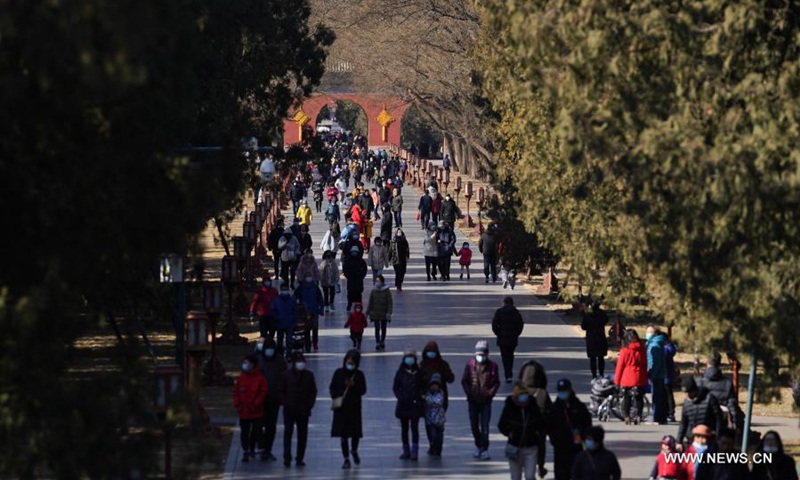Big cities retain 75% traffic limit despite nationwide scrapping of volume controls
With China gradually relaxing COVID-19 prevention measures as the epidemic is put under control, the nation’s consumption is speeding up its recovery.
The catering and services industries have been the first to pick up, with some restaurant chains and tourism sites estimating at least a 15-percent jump in revenue as group dining and inter-city tourism returns to normal.
Yet business owners in the virus-hit movie sector told the Global Times that there has been no significant gain in traffic volume in theaters.
Wang Bin, general manager of New Jingya Cook Superb Cuisines – a medium- to high-level restaurant chain in China – told the Global Times on Tuesday that he looks forward to the implementation of new pandemic prevention measures, especially easing curbs on group banquets and reducing the requirements for entering Beijing, which could boost the restaurant’s revenue at least 15 percent in 2021.
Effective Tuesday, passengers with green health codes coming from low-risk areas can travel freely across the country by rail, and those who wish to enter or leave Beijing no longer require a negative nucleic acid test taken within seven days.
Industry observers said that the new policy, which allows free flows of people between different cities, paves the way for reviving the tourism sector and resuming business travel.
“The genuine restrictions on the services sector’s revenue are not due to pandemic prevention measures, but rather to consumers’ confidence,” Wang said, noting that the new policies also sent a signal that the pandemic situation in China is sound, which could in turn strongly boost consumers’ willingness to join group banquets.
According to Wang, the restaurant’s annual revenue – which is made up of income from both banquet and dining hall services – was formerly about 27 million yuan ($4.15 million), of which group banquets accounted for 5-10 percent. This year, group banquets could contribute at least 5 percent of the total revenue, compared with zero last year.
“As more trips are made, I expect that the revenue of dining-hall services will increase at least another 10 percent,” Wang said.
Yang Ying, vice general manager of Windsor KTV, a leading KTV company in China, told the Global Times on Tuesday that the new policy will definitely be a strong boost for China’s entertainment sector.
“During the pandemic, our customer traffic limit was about 50 percent, and the number of customers at each banquet was also limited. The new policy means that business in the entertainment sector is back to normal,” Yang said.
An executive of a performing site for group tourism in Beijing’s Chaoyang District, who preferred not to be identified, told the Global Times on Tuesday that as more tourists visit Beijing in the coming months, she expected that the performance, which is scheduled twice a day, could bring at least several million yuan in profits this year.
“Our theater suffered a loss of about 10 million yuan last year. But things are going quite well now, amid China’s efforts to stifle the virus,” the executive said, adding that employees are rehearsing dances for the three-day Qingming Festival holidays.
A manager surnamed Liu from a Thai massage club in Beijing predicted a drastic improvement in revenue this year as China rolls out a nationwide vaccination program.
“It will give Chinese consumers a sense of security to go to public places and spend,” Liu said, noting that traffic in his shop has surged by 30 percent compared with last year.
However, the Global Times noted that consumption in movie theaters and other services venues seems to be slow to pick up steam, as the capital city of Beijing and some other major cities – including Shanghai and Shenzhen – still enforce stringent anti-epidemic measures.
“The movie ticket sales [on Tuesday] were almost the same as before, since the viewer limit at movie theaters was still set at 75 percent. Other anti-epidemic measures are also being enforced as before,” a manager of Chaoyang Theater in Beijing surnamed Li told the Global Times on Tuesday.
China’s Ministry of Culture and Tourism announced on Monday that overall visitor volume limits for cinemas, internet cafes and other entertainment places in low-risk areas will be dropped and can be adjusted by related departments of local governments.
Li said that they haven’t received any notice from local regulators on relaxing the limit to date.
As the traditional summer box office season is approaching, Li said she hoped the authority could consider completely scrapping audience limits to generate more ticket sales.
An employee at a movie theater in Chengdu, capital of Southwest China’s Sichuan Province, said that the facility no longer needs to strictly abide by the 75-percent traffic limit.
Luo Jiajie, a manager at the Tianshan Cinema in Shanghai, told the Global Times on Tuesday that all cinemas in the city to date are still carrying out the 75-percent cap on moviegoers.
“The number of visitors has yet to soar, but [relaxing the limit] is a good sign for the industry,” Luo said.
In the first two months, China’s retail sales rose by 33.8 percent year-on-year, according to data from the National Bureau of Statistics. Analysts expect consumption to become the major engine powering China’s economic growth in 2021.
People visit Tiantan (Temple of Heaven) Park in Beijing, capital of China, Feb. 17, 2021. (Xinhua/Ju Huanzong)



